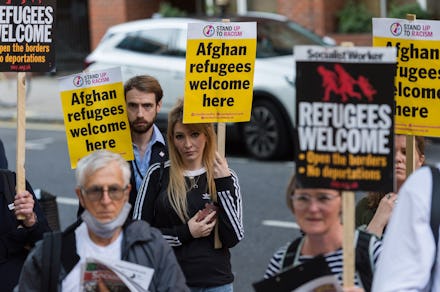Airbnb will house Afghan refugees, a great reminder that the resources to help people in need already exist

On Tuesday, Airbnb announced that it would work with hosts in the United States and around the world to temporarily house 20,000 refugees from Afghanistan who need shelter. The company's nonprofit, Airbnb.org, plans to match refugees with prospective hosts who are willing to open their doors to those in need. Airbnb, company CEO Brian Chesky, and contributions to Airbnb.org will be used to cover the costs for housing the refugees for either short or longer-term stays, per information shared by Chesky on Twitter.
The move is certainly a generous one, at least when you compare it to what the United States government is offering. Earlier this month, the Pentagon announced a plan to accept between 20,000 to 22,000 refugees — an embarrassingly paltry number when you consider the government is well aware that there are tens of thousands of people in need of housing as they flee from Taliban control, not to mention the fact that all of this is happening because of America's long and unnecessary occupation and eventual abandonment of the region. So, sure, points to Airbnb for basically matching what the richest country on Earth, and the one responsible for the problem in the first place, has managed to muster.
To its credit, Airbnb has done this before in times of need. The company opened up its doors (well, more specifically, it asked other people to open their doors while putting out a press release about all the good that the company is doing) to people displaced by hurricanes, flooding, and other natural disasters. The company has also helped frontline workers find housing during the coronavirus pandemic.
But it's impossible to look at Airbnb's response and not be smacked in the face with the realization that the infrastructure required to meaningfully help people in need already exists, and in America we simply fail to use it until we absolutely have to — or until it might get some good buzzy press.
It's just as hard to ignore the fact that while Airbnb has reportedly helped more than 75,000 people find shelter when they need it over the last decade, the company also has played a role in creating a housing crisis. Airbnb has made renting out property for short-term stays considerably more profitable, leading some landlords to shift away from providing long-term, affordable housing to cash in on vacationers and honeymooners instead. Studies have found that the short-term market has driven up the annual rent for neighborhoods across the country while reducing the number of available units for people who actually need long-term housing. It has driven up the cost of purchasing a home, too, making the housing market less tenable for those who might be looking to buy and remain in an area for the long haul.
And while Airbnb may contribute to the problem, it certainly isn't alone. While Kanye West takes up sole residence in a football stadium designed to hold more than 80,000 people, there are more than 3,200 people living on the streets of Atlanta outside the venue. They could certainly make better use of the shelter provided by the building that is only in use a few days out of the year.
Even when the infrastructure isn't already in place, we absolutely have the resources to build it. States and municipalities typically have no problem budgeting $100 million to build a facility that houses over 1,000 people at a time — as long as it's a jail. Meanwhile, shelters for homeless people are often met with political resistance and protest from upper-class communities despite often being cheaper and producing better outcomes.
The fact that Airbnb hosts are helping refugees is a good thing, and those who are getting the support they need should absolutely not have to think about anything beyond doing what is necessary to keep themselves and their loved ones safe. But the rest of us can certainly remember that these little moments of seemingly extraordinary help don't have to be so uncommon. We have the resources to help those in need all the time. We just have to start choosing to do it.